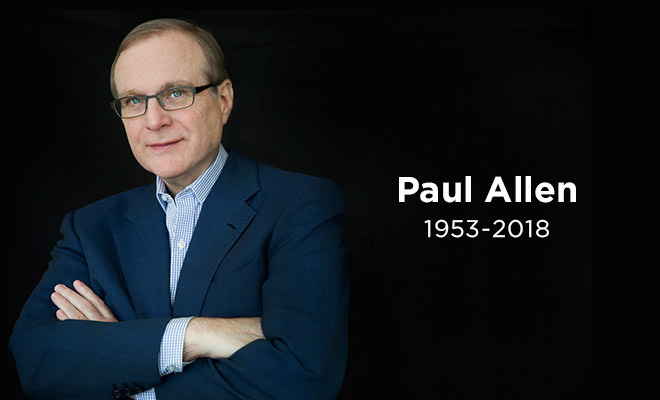Paul Allen, co-founder of Microsoft, entrepreneur and philanthropist, died on Monday after a long bout with non-Hodgkins lymphoma. He was 65.
Allen's investment firm Vulcan Capital confirmed his passing in a statement.
All of us who had the honor of working with Paul feel inexpressible loss today. He possessed a remarkable intellect and a passion to solve some of the world's most difficult problems, with the conviction that creative thinking and new approaches could make profound and lasting impact.Millions of people were touched by his generosity, his persistence in pursuit of a better world, and his drive to accomplish as much as he could with the time and resources at his disposal.
Allen died in Seattle two weeks after revealing a return to treatment for the cancer he had fought into remission nine years ago. He was diagnosed with Hodgkin's lymphoma in 1982, a disease that prompted his departure from Microsoft in 1983.
One of the richest people on earth, Allen is best known for co-founding Microsoft with Bill Gates in 1975. It was Allen who inked Microsoft's deal for Tim Paterson's Quick and Dirty Operating System, which was ultimately delivered to IBM for use in the company's PC products. Microsoft grew from there to become a tech industry titan.
Though he officially left Microsoft's board of directors in 2000, Allen stayed on as an advisor to Gates and held millions of shares of company stock. At the time of his death, Allen's estimated net worth was pegged at above $20 billion.
"As co-founder of Microsoft, in his own quiet and persistent way, he created magical products, experiences and institutions, and in doing so, he changed the world," Microsoft CEO Satya Nadella said in a statement. "I have learned so much from him - his inquisitiveness, curiosity and push for high standards is something that will continue to inspire me and all of us at Microsoft."
While his contributions to modern computing are substantial, Allen's philanthropic and extracurricular endeavors far outweigh his business accomplishments. He made significant investments to fight Ebola and founded medical research institutes the Allen Institute for Brain Science, Allen Institute for Cell Science and The Paul G. Allen Frontiers Group.
His investments realized Burt Rutan's SpaceShipOne commercial aircraft, while personal initiatives Stratolaunch Systems and Vulcan Aerospace seek to reduce the cost of space travel.
Allen also sank millions into sea exploration, discovering the wrecks of the USS Indianapolis, USS Lexington, USS Juneau and other historic ships. With the Royal Navy he led two attempts to recover the bell of the HMS Hood.
Allen also bought controlling interests in Charter Communications and Ticketmaster, and owned both the NFL's Seattle Seahawks and the NBA's Portland Trail Blazers.
"Paul's family and friends were blessed to experience his wit, warmth, his generosity and deep concern," his sister Jody Allen said in a statement. "For all the demands on his schedule, there was always time for family and friends. At this time of loss and grief for us - and so many others - we are profoundly grateful for the care and concern he demonstrated every day."
Not everything Allen touched turned to gold, however. His Interval Research Corp., an early tech incubator and patent farm, went belly-up in 2000. Patents from Interval were later used to sue Apple and a number of other tech companies in 2008, then again in 2010 after the initial legal volley was dismissed.
"Our industry has lost a pioneer and our world has lost a force for good. We send our deepest condolences to Paul's friends, the Allen family and everyone at Microsoft," Apple CEO Tim Cook said in a tweet.
Allen is survived by his sister Jody.
 AppleInsider Staff
AppleInsider Staff







-m.jpg)






 Charles Martin
Charles Martin

 Malcolm Owen
Malcolm Owen
 William Gallagher
William Gallagher

 Christine McKee
Christine McKee
 Wesley Hilliard
Wesley Hilliard









50 Comments
He didn’t have kids. Strange.
I'm getting to an age where 65 seems like a very early death.
Didn't he also found the Experience Music Project (now called the Museum of Pop Culture) in Seattle? (Why, yes he did.)
I grew up with him in the forefront of tech. Him, Balmer, Gates and Jobs. 2 are gone... Darn... I am old.
I'm very sorry at his passing. RIP Paul Allen.
The reports saying how much he contributed to modern computing surprise me a little. I think of Microsoft’s relationship to technology like McDonalds’ relationship to cuisine—sure, they have been innovative over the years, but not in terms of coming up with outstanding breakthrough products, just very good at getting a huge number of customers to buy a few standard products over and over again. It would be interesting to see an in-depth DED piece (is that redundant?) covering significant MS innovations over the years, if such an article is possible.